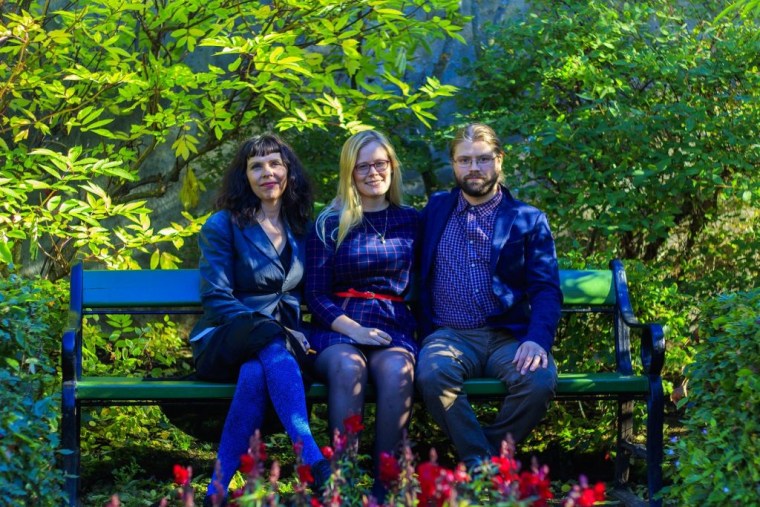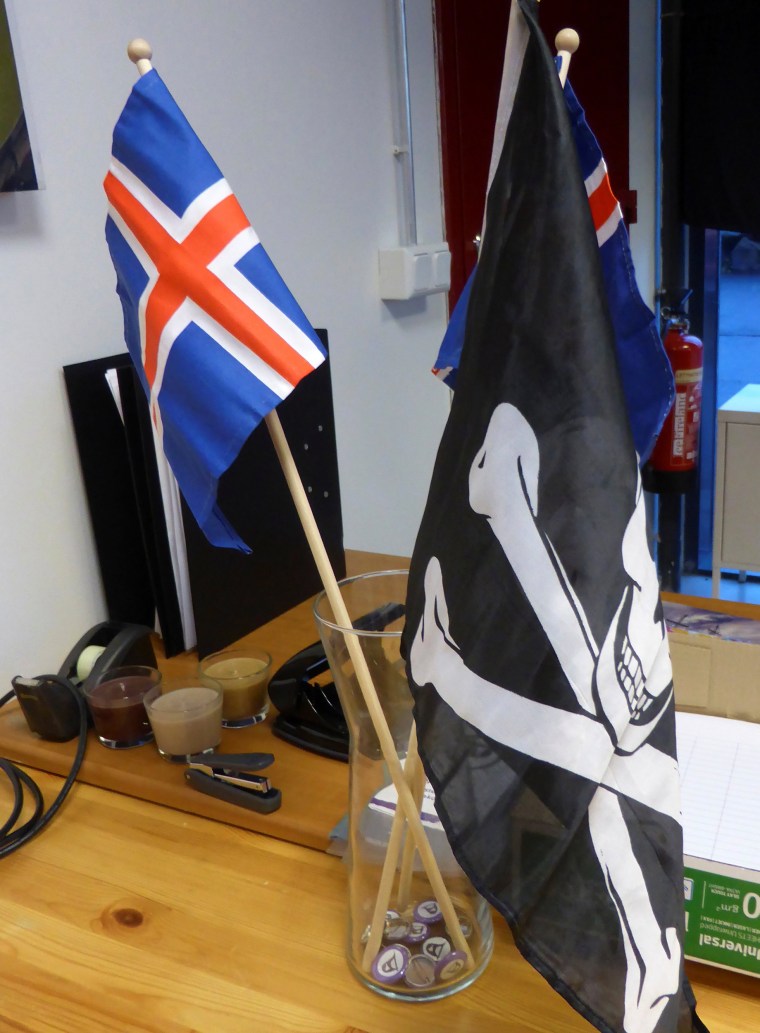The Pirate Party may sound like a novelty political outfit, but this former ragtag bunch of internet activists may be on the verge of winning Iceland's parliamentary elections Saturday.
The party was founded less than four years ago and promises a radical platform. Its members want to legalize drugs, crowd-source their policies using online referendums, and grant citizenship to National Security Agency leaker Edward Snowden.
The majority of polls over the past 18 months have predicted the party will win the most votes on Saturday — a radical pirate victory in the land of the Vikings.

"I think it's because we have been approaching politics in a new way," said Pirate Party lawmaker Ásta Helgadóttir, explaining her movement’s exponential rise. "We have been trying to do more evidence-based politics rather than just following ideas blindly."
Iceland’s population of some 320,000 is half the size of Boston’s and its landmass would comfortably fit inside the state of Colorado. It is a NATO member but has no armed forces, instead contributing to the alliance with cash and civilian personnel.
While politics on this small island of snow and volcanoes may seem insignificant when compared to the boisterous U.S. presidential race, the rise of Iceland's Pirate Party mirrors a global trend that has seen voters rejecting the political mainstream.
"We are trying to be the Robin Hood of democracy"
"The Pirates are a radical anti-establishment party," according to Baldur Þórhallsson, a professor of political science at the University of Iceland. "But there are still lots of questions: How will the Pirates be in government? Will they be able to function in government?"
Iceland's electoral system means it is almost impossible for one party to win an outright victory. Instead, after the election is finished, parties of similar stripes enter into negotiations to try to form a coalition to lead the country.

Polls suggest that even if they don’t get the most votes, the Pirate Party may enter into progressive alliance with the Left-Liberal Movement and the Social Democrats.
This would make Iceland an outlier in a Europe tilting to the right.
"The agenda that we are putting forward is a social-liberal agenda, which is something that people like and value here in Iceland," said Helgadóttir, a 26-year-old history graduate who is one of three pirate lawmakers in the Althing, Iceland's 63-seat parliament.
If the Pirates did find themselves in power it would mark a staggering ascent from obscurity.
Its origins can be found in 2006, when a Julian Assange-style figure named Rick Falkvinge founded the Swedish Pirate Party with the radical agenda of tearing up internet copyright laws.
Falkvinge chose the name as an attempt to take ownership of the term "piracy," which he felt had become an unfair slur against people who shared music and movies online.
Now there are pirate parties in more than 60 countries — although before this weekend none has threatened to take a seat in government.
Much like its Swedish cousin, the Icelandic offshoot grew from a group of internet activists.

It has no official leader but the party's de-facto head is Birgitta Jónsdóttir, a former WikiLeaks collaborator who has written several poetry books and describes herself as a "poetician."
Jónsdóttir's Pirates have now expanded their agenda well beyond their hacktivist roots — but the internet still plays a big part in the party's ultra-democratic, ultra-progressive vision of the future.
Its main aim is to involve Icelanders far more in the country’s democracy, shifting power away from what it sees as an unaccountable political elite.
To do this, all of its policies are crowd-funded, with members suggesting, debating and voting on each manifesto pledge through an online forum.
Related: Iceland's Prime Minister Resigns Over Panama Papers
"It's important to understand that the Pirate Party is not here to govern or actually be in power," explained Helgadóttir. "We are trying to give power, we are trying to be the Robin Hood of democracy."
Its members insist that all decisions should be based on evidence — rather than religious or cultural traditions — including their pledge to legalize all drugs.
The party wants all government information to be readily available to the public, allowing "the powerless the power to monitor the powerful."
It wants total freedom from government surveillance and has said it would grant asylum to Snowden — who they see as a hero.
Is Helgadóttir worried granting a haven to the NSA leaker might rile Iceland’s NATO ally in Washington?
"Yeah, well we have done things that don’t make other nations happy before," she said. "Sometimes it’s a case of what’s doing what is right versus what is easy."
Others might also point out that direct democracy has had something of a controversial year. Britons chose to ignore experts’ advice and sever ties with the European Union, Hungarians rejected immigrants, and Colombians opted to tear up a peace deal that took years to broker.
Does Helgadóttir foresee any pitfalls with handing the reins to the masses on every issue?
"All those examples are basically referendums that are more or less put forward by politicians to serve their political agenda," she said. "That’s not the kind of referendum that we want to participate in."
She accepts that if the Pirates win power they may have to temper their idealism with a dose of pragmatic realpolitik. But said said that having three lawmakers, as well as partial control of the local government in the capital, Reykjavik, has given them ample training.

Other critics claim that the party’s popularity owes more to protest votes than highfalutin ideals.
In the past ten years, Iceland has lurched between right and left-wing governments and back again. These administrations have delivered a colossal banking crisis and an international scandal in the form of the Panama Papers.
"First the Icelandic people voted for the left and then the old-guard again — so who’s left?" said Þórhallsson, at the University of Iceland. "Many voters are not voting for internet freedom and drug decriminalization, they are protesting against the traditional parties."
Helgadóttir dismisses the suggestion out of hand.
"There are actually quite a few parties that have been established in the past eight years since the financial crisis, but the only party that has had any success is the Pirate Party," she said. "I think the success of the Pirate Party is the fact that we are not only a protest party but actually something that has a clear idea of how we want society to be run."
Whatever the result Helgadóttir and her fellow Pirates are savoring the moment.
"We are just thankful that people trust us," she said with genuine delight in her voice. "We are just thankful that this is happening and we actually get to be a part of it. We just want other people to join us."
